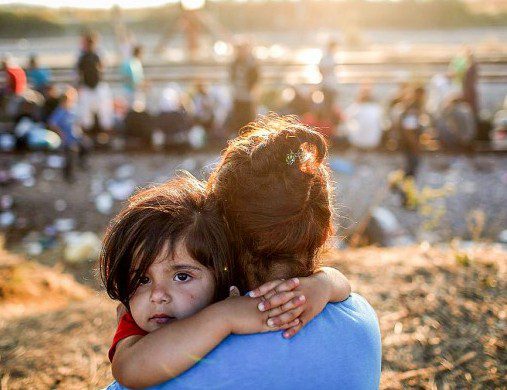I’m sure I’m the only pastor in the world who’s been accused of “being too political.”
Lol. I’m kidding. Every minister who addresses justice issues will inevitably be accused of being political.
Sometimes it’s true. Sometimes the church IS political, and sometimes that’s ok. Read Benjamin Corey’s post about how Jesus was political; and maybe we should be too.
At other times, we aren’t being political at all. Rather, the person who’s accusing us of “wading into a political issue” is looking at that issue through a purely secular lens… In fact, in many cases, it is the secular worldview that politicizes a spiritual issue. The question is, are we able to discern when that is happening–and articulate it as such? As faith leaders, that is a pretty critical part of the job. Especially in such times as these.
Case in point: refugee ministry. Last week I wrote a post about all the major denominations that have issued statements reaffirming their commitment to refugee and immigration ministry.. The range of voices represented in this matter makes it clear that this is not a political issue; for the body of Christ, it is a human issue, and a critical one at that. And yet, inevitably, folks in our churches criticize relief efforts, writing off this important work as “just politics.”
To that I say: maybe try reading the gospels again and then check back in later.

We are witnessing some of the greatest humanitarian crises of all time, as they unfold in real time. In Syria and other war-torn regions of the Middle East; in the Central American drug wars; and now, apparently, in Sweden?
Maybe that last one is a joke. But this is no joking matter. If people of faith choose to avert our eyes from the horror happening in the world around us, washing our hands and shrugging it off as politics–then we don’t get to claim that any part of our faith is real, or relevant to the world. We might as well pack up shop and quit preaching anything called good news, because we will have effectively proclaimed to the world that we’re only in this for the free coffee and the tax deduction. And maybe to make our grandma happy.
If you don’t want your church getting involved in politics, that’s one thing. But refugees are not political. Are there political refugees? Sure. There are people who must flee their homes because the political climate of their homeland has made it a dangerous place to be. But there is nothing “political” about a terrified mother with a frightened child strapped to her back, and another tripping and trailing behind. There is nothing “political” about families saying good-bye at border crossings, desperately hoping that they may see each other again someday. There is nothing political about that baby, laying facedown and drowned on a Turkish beach. You want to look that child’s anguished father in the face and tell him we can’t get involved? Because politics?
The sick and tragic thing is, refugees have been politicized–in some truly grotesque ways–by American politicians. Many of our current leaders have used refugees and immigrants as scapegoats, blaming them for our security problems, painting them as the monsters under the bed, and the vague scepters that keep us awake at night. The rise of Nationalist sentiment and xenophobic rhetoric–palpable in our national discourse lately– has not emerged in a vacuum. Someone has to play the villain in order for that to happen. And who better to place in that role than the most vulnerable, traumatized, and desperate people in the world? But refugees didn’t create that fearful climate. Politicians did.
Refugees are not political. But they have been politicized. They have been politicized and dehumanized, which is a crime against humanity. That narrative of “dangerous strangers from elsewhere” is entirely secular; a narrative that the Church is called to replace with one of peace and compassion. Anyone who calls that work “political” has mistakenly read the Bible as an outmoded morality tale–and mistaken a political party line for some form of religion.
It’s time to disentangle those two narratives from each other, and unashamedly answer Jesus’ call to welcome the stranger. If that means offending folks who want the Church to remain above the fray, then so be it. It’s a nice idea, that the church can stay out of ugly political discourse and somehow remain pure and untouched by the world. But we are not called to some disembodied spirituality that ignores the suffering world and worships a far-off God. There is no living above the fray while following Jesus. And that’s not politics–it’s the gospel truth.
Photo via Flickr












